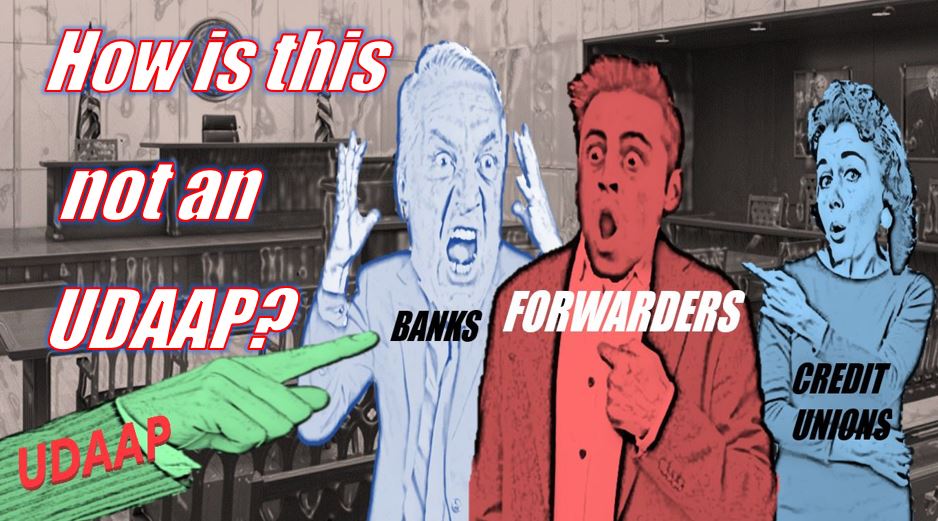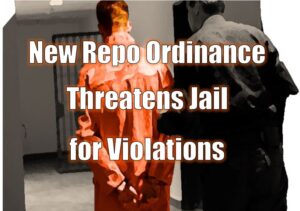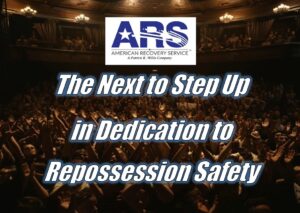Lenders billing consumers for fees that vendors were never paid
EDITORIAL
Consumer Financial Protection. It’s the first three words in the bureaus name. It would seem completely obvious that a lender would be committing consumers wrong by charging them fees that weren’t actually owed. So why is the CFPB ignoring the flagrant Unfair, Deceptive and Abusive Practice (UDAAP) being perpetrated on the American consumer?
Hypocrisy
Hardly a week goes by that I don’t hear an agency owner complaining about tens of thousands of dollars in unpaid repossession fees by the national repo forwarding companies. Some are far worse than others, but the problem is persistent and is often justified by contract clauses prohibiting payment of invoices older than 30 days old or less. Invoices that the forwarders claim they never received however persistent the agency owners pester them for payment and continue to resubmit them to no avail.
So, how did things get this bad? Well, it became well known back in October of 2017 when Consolidated Asset Recovery Systems announced their need to enforce punitive actions against agents for failure to report repossessions within their service level agreements. The punishments included, compliance holds, suspensions and repossession fee forfeitures.
 This is a hypocritical situation in an industry whose primary objective is in the recovery of collateral resulting from unpaid debts. It’s one that some in the forwarding industry seem to gleefully take advantage of while slapping happy face emojis’ on notices of their intent to continue this practice on their agency networks.
This is a hypocritical situation in an industry whose primary objective is in the recovery of collateral resulting from unpaid debts. It’s one that some in the forwarding industry seem to gleefully take advantage of while slapping happy face emojis’ on notices of their intent to continue this practice on their agency networks.
Deficient Legal Notices?
What’s worse, is that this practice goes on and the forwarders are being paid by the lenders. Lenders, who, as required by the Uniform Commercial Codes and relevant state laws such as California’s Reese Levering Act, send the borrowers from whom were repossessed, letters of Notice of Intent to Sell Collateral (NOI).
And after the vehicle is sold, they are provided a notice of deficiency balance. In this letter, it is represented in an itemization, all fees associated with the recovery and liquidation of the collateral.
These are legal forms and very litigious ones at that. Forms that trigger class action lawsuits. A detail as small as whether certain fees must be paid directly to an agent or the lender listed on the NOI’s garner settlements in the hundreds of thousands here in California. In litigation, little things mean a lot. And while this may seem to be a minor issue to most lenders that they feel no responsibility for, in court it could prove to be a serious and expensive headache.
Unpaid Invoices
As an agency owner with unpaid invoices, I would be awfully tempted to chase down those borrowers whose cars you’d repossessed and get my hands on some of those notices sent by the lenders. Notices that would clearly show the borrower being charged for the full repossession AND the forwarders fees all expressed as one item.
I’m a pretty fair judge of human nature, so I’ll go out on a limb and make a guess. Those same borrowers, still stinging from the pain of repossession, would find it more than a little unfair and  deceptive of the lender to charge them for a fee that the agency never got paid. And worse, a much higher bill than the one charged for the actual repossession.
deceptive of the lender to charge them for a fee that the agency never got paid. And worse, a much higher bill than the one charged for the actual repossession.
Afterall, did the forwarding company repossess the vehicle? No. And then why on God’s green earth would the borrower be charged $450-$575 or more for a repossession that the agent only billed $350-$400 for?
Deceptive? Oh yeah.
Feeding Stray Cats
If enough of these borrowers found this out, eventually, one will contact an attorney who specializes in repossession lawsuits. We all know that there’s no shortage of them running around these days. The law of averages says that it would eventually be tried in a court of law, that is, unless every lender and the forwarders just settle their way out of court beforehand, as they are oft to do.
And as the practice of feeding stray cats goes, so goes the nature of puppy mill lawsuits. Lawsuits that the attorneys know will pay out with no real labor beyond punching out cookie cutter letters and lawsuit filings with the courts.
So as a lender, you’re probably thinking; I paid the forwarder, so I’m safe. What happens between them and the agent is none of my business.
This brings up a legal question of is a lender shielded or insulated by their vendor relation with a forwarder for actions that they may or may not be aware of. I’m no lawyer, but I’d doubt it. Let’s face it, when the lawsuits start, the summons and discovery document requests are flung around with the ease and generosity of an Oprah audience giveaway. Guilty or not, you’re going for a ride and an expensive one at that.
 But I’ll fight it!, you think. No, you won’t. You’ll contact your bond carrier who will take over the whole matter. And as a common practice of cost benefit analysis, they’ll cough up settlement money and you’ll wipe away the entire debt and delete the entire credit history.
But I’ll fight it!, you think. No, you won’t. You’ll contact your bond carrier who will take over the whole matter. And as a common practice of cost benefit analysis, they’ll cough up settlement money and you’ll wipe away the entire debt and delete the entire credit history.
As a lender, you know I’m right and you’ve probably done it many times already. Feeding stray cats (frivolous lawsuit attorneys) is a price of doing business that’s hard to get around. The more you feed the stray cats, the more they keep coming back for more.
Big Brother CFPB
Now, for all of their crusades in the name of fairness and creating a level playing field to protect the public from the evils of the lenders in this world, the CFPB has been pretty absent in the realm of repossession forwarding and I’ve been scratching my head on this for years.
Like sharks smelling blood, if irregularities in reporting debts to consumers attracts their attention, there is a pretty good chance that they will move in. No, the plight of the repossession industry is not quite in their scope of importance enough to warrant their taking action. I know it’s not because I know people who have advised them of this and still nothing has happened.
The CFPB does have the authority to examine third party vendors, something they made a point of reminding everyone about on April 25th . Fact is, since its inception in 2010, the CFPB has had the authority to conduct rulemaking and supervise auto loan servicing.
As recent as April 26th, the Consumer Financial Protection Bureau (CFPB) issued their Spring 2022 Supervisory Highlights which listed at the top of their priorities Auto Servicing and Wrongful Repossessions. Repossession forwarding is auto servicing and subject to CFPB examination. Something they haven’t been too involved in yet, but that doesn’t mean it’s not coming once repossession volume really picks up.
Is it all an UDAAP?
I am not a lawyer. This is not legal advice. This is just my observation and opinion. An opinion that needs to be measured by legal definitions and standards. Standards that the CFPB has already laid out.
According to the CFPB; The standard for unfairness in the Dodd-Frank Act is that an act or practice is unfair when:
- The act or practice must cause or be likely to cause substantial injury to consumers.
Substantial injury could be argued as charging consumers for goods and services that the participating vendor (agency) did not receive compensation. Hidden fees in the form of forwarding fees disguised as repossession fees in the legal notices.
Arguable, but probable in my humble opinion.
- Consumers must not be reasonably able to avoid the injury
Clearly consumers have no way of avoiding this aside from keeping their loan current and avoiding the repossession altogether. Likewise, how could they avoid what they are unaware of and was not disclosed to them.
Slam dunk. Check.
- The injury must not be outweighed by countervailing benefits to consumers or Competition
There is absolutely no countervailing benefit to consumers achieved by letting forwarders pocket repossession fee income expected to be paid to the agencies who actually performed the service.
Truth be told, many lenders still manage their own repossessions. Once upon a time, all lenders did it. Now they are allowed to bill the consumer for this outsourcing of services otherwise well within their capacity and do so without clearly disclosing this? What next, fees for phone calls from outsourced collectors?
In the Forwarders defense, these agencies signed on for this. A decision that most felt under pressure to do so out of fear of missing out on the some odd 70% or more of all repossession assignments controlled by the Forwaders. These clauses,legal or not, are unfair and give the appearance of being abused. Abused or not, this is a choice and business decision that the agency owners made.
But the consumer neverr had a choice. Is it fair to the consumer that the Forwarder pockets the bill for the repossession that they did not perform themselves and were told by the lender they owed? If the repossessor wasn’t paid for their services, then why should the consumer have to pay it?
This is messy. Whether or not it fits all of the varying definitions of an UDAAP could very well become open for legal discussion by practicing attornies if discovered by the right, or wrong people, depending upon your position in the matter.
Quit Playing Games
One might think that these are isolated events affecting a small number of agencies and recoveries. Agencies with poor office management and no company discipline, but they’re not. This is a problem affecting probably the majority of repossession agencies engaged in repossession forwarding. Well established professional agencies that have been in existence for generations as well as new ones.
And the numbers are in the tens of thousands of dollars per agency. Tens of thousands of dollars multiplied by probably hundreds of agencies across the country. And that’s hundreds of thousands of dollars pocketed by the forwarding companies.
That’s tens of thousands of repossessions paid for by lenders that the forwarders pocketed. And that’s tens of thousands of debtors who’d been repossessed from and advised that those fees went to paying a repossessor for having done their duty. When in reality, it stopped in the pocket of a middle man, a broker, a middle manager.
I am not an attorney, but as a layman, this all looks like an UDAAP to me and it seems to me that it’s just a matter of time until someone smarter than me in the legal or examiner world sees it too. And if, or when that does happen, it will be expensive. I suggest that you all discuss this with your attorneys.
To the forwarders to whom this applies, quit playing games and pay your agents.
To the lenders reading this, let me ask you this; how many of those forwarder bills did you pay that the forwarder pocketed? I’d wager that you have no idea and have never done an audit of it. Well, rest assured, if it gets the attention of the wrong people, be it consumer attorneys or the CFPB, they’ll do a fine job for you. And if they do, it could get real messy.
Kevin Armstrong
Editor (NOT AN ATTORNEY)











Facebook Comments